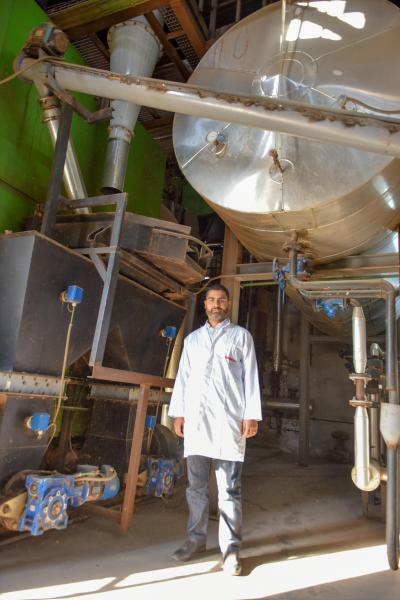Zalar Holding is expanding internationally after consolidating its position in Morocco’s poultry market
By Driss Charrier Rachidi
Before 2020, the role of Mehdi Benzakour, director of the animal feed and hatchery units at Zalar Holding Group, was managing uneven production dictated by irregular demand, in the face of deliveries agreed in advance with customers.
Mehdi supervised technical teams in Fez and Casablanca to ensure price stability and consistent production over time. Enabling stability was complicated, especially given that the poultry production cycle spans 14 to 16 months, with periods of overproduction and underproduction.
“Our breeder customers buy the chick and the feed that goes with it.,” Mehdi said. “Animal feed is difficult to sell on its own. The chicks are a sales vehicle for the feed.”
Since 2013, Zalar has embarked on an ambitious industrial integration strategy across the entire value chain of the poultry sector. Zalar is now an agribusiness leader that is developing internationally. This transformation has been achieved through the reorganisation of its governance structure and substantial investment.
Rapid expansion
Ten years ago, Zalar owned two commodities storage terminals in Morocco, in Casablanca and Jorf Lasfar. The Group now has six. Zalar’s trading subsidiaries are the only local players present in all grain ports in Morocco. Two of them were financed by the European Investment Bank (EIB), Nador in the Mediterranean and Agadir on the Atlantic coast.
Such storage capacity provides a strategic advantage for the Group, which can now carry large cargos of goods and unload at different ports instead of unloading in bulk in Casablanca and transporting goods by truck from a single point. The Group’s trading arm has become a leader on the Moroccan market, totalling 3 million tonnes per year.
“The financing of two terminals near the ports of Agadir and Nador has enabled us to become more competitive, with new strategic storage capacities for trading,” said Siham Benhamane, Managing Director of the Zalar Group, adding that “this strategic advantage differentiates us from our competitors because we have more presence in Morocco.”
Creating a leader in Morocco
Founded in 1974, Zalar Holding is the leading industrial group in the poultry sector in Morocco. With 3 000 employees in 12 subsidiaries, including one in Senegal and another in Mauritania, the Group covers the entire value chain across five business arms: raw materials trading, animal feed, hatchery, the broiler industry, and slaughtering and meat processing.
Agriculture is a key economic sector in Morocco. It contributes 13% to national GDP and accounts for 38% of total employment at national level (74% in rural areas). The agrifood industry as a whole has grown by an average of 6% over the last ten years. This growth is driven by higher domestic demand and a greater number of international distribution channels, particularly in Africa.
In 2019, Zalar launched a new phase of expansion, with the support of the European Investment Bank, which lent the Group €25 million. “This investment has a catalytic effect on the whole sector in Morocco, by supporting the dynamics of the sector leader,” said Anna Barone, head of the EIB representation to Morocco, “while fostering a structure that respects the best environmental, health and social regulations,” she added.

Mehdi Benzakour, Director of the animal feed and hatchery business arms at the Zalar Group.
Vertical integration
This investment made it possible to finance new Group activities at a key point in its development. The EIB’s backing strengthened value chain integration and supported the expansion of the Group's trading activity — which accounted for 43% of its turnover in 2020. The EIB loan focused specifically on:
- expansion of grain storage facilities, as part of the Group's trading activity, to support animal feed production capacity;
- construction of new stock farms and breeding farms;
- extension of existing hatchery capacity;
- modernisation of existing farms located in Morocco's four main consumer regions.
“The EIB loan enabled us to build farms and quickly have new upgraded units,” Benhamane added. The investment has also contributed to the creation of new jobs, especially in rural areas: around 10-15 per farm.
Thanks to these investments, Zalar now plays a structuring role in the Moroccan market. The Group’s turnover increased from around MAD 4.5 billion (€422 million) in 2016 to nearly MAD 6 billion (€560 million) in 2020.
Navigating the COVID-19 pandemic
In 2020, the COVID-19 pandemic severely affected the poultry sector in Morocco. With rising commodity prices, there was a dramatic fall in demand due to the closure of schools, restaurants, the ban on festive events and tourist restrictions.
Chicken prices fluctuated significantly, ranging from MAD 6 to MAD 19 (€0.60 to €1.80), while production costs under optimal conditions ran to MAD 12 (€1.10). This economic climate put considerable pressure on the Group’s liquidity in 2020.
“The EIB stood by us during the toughest moments of the COVID pandemic”, said Driss Chaouni, Deputy CEO of Zalar Holding. At the height of the pandemic, the EIB stepped up its support to companies to help cope with the COVID-19 crisis, a measure that directly benefited the Zalar Group.
The Bank exceptionally agreed to provide €10 million to finance the company’s cash flow. The money also enabled the Group to continue its expansion in Senegal, although the health crisis slightly hampered this development. Driss underscores that even if “Africa is strategic, without qualified people on the ground to follow and execute projects, Africa is impossible.”